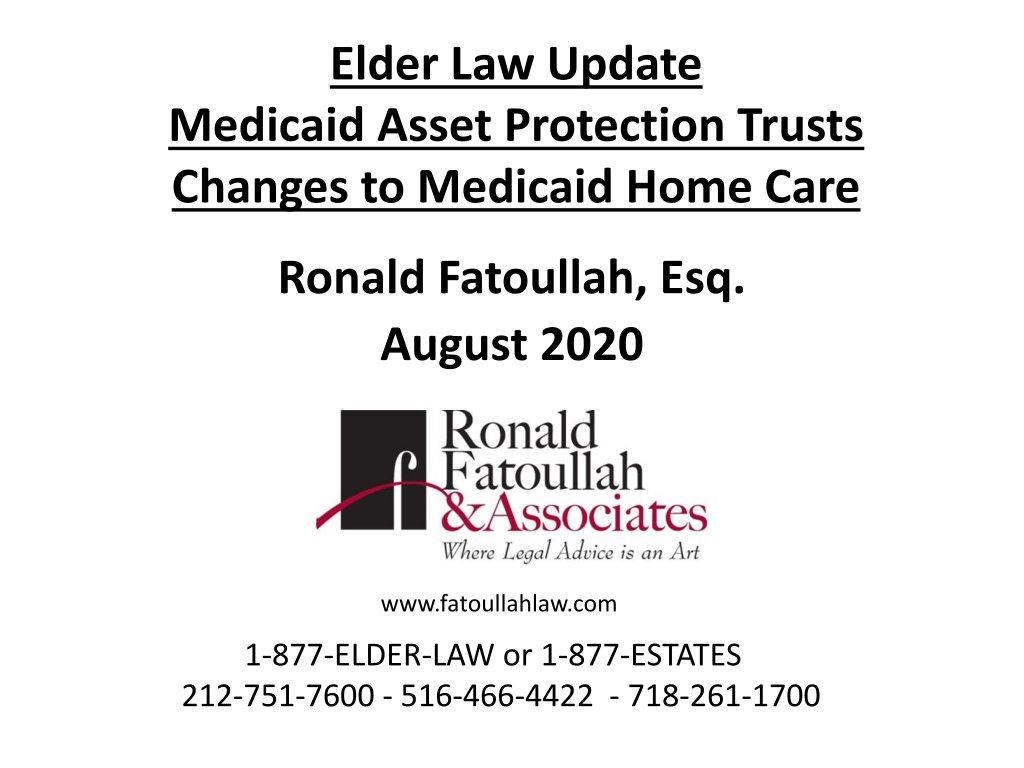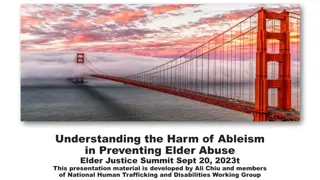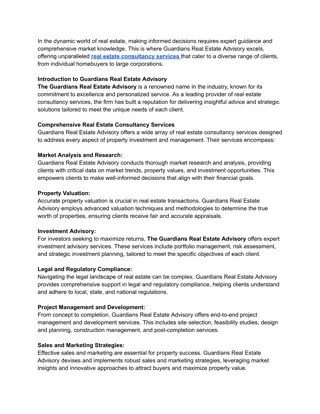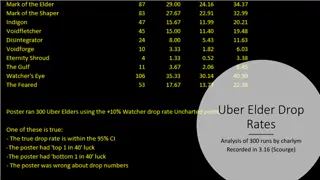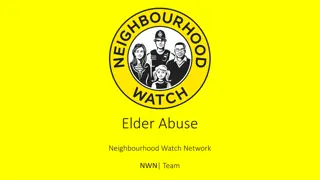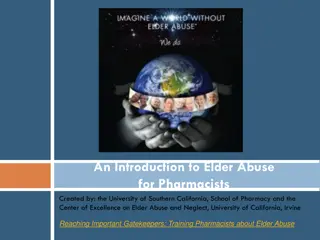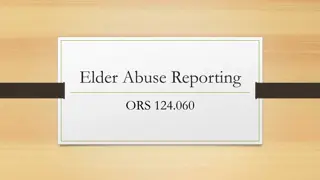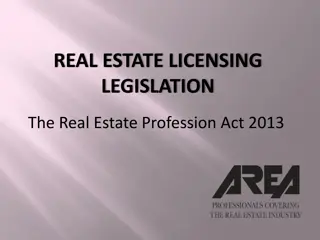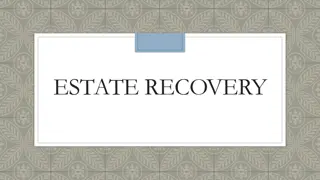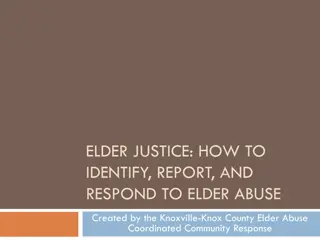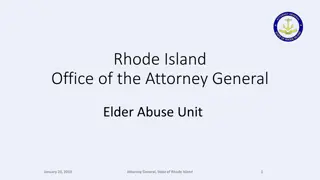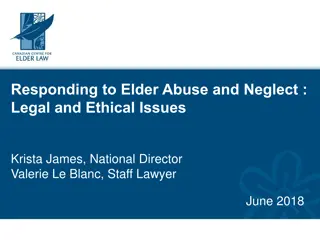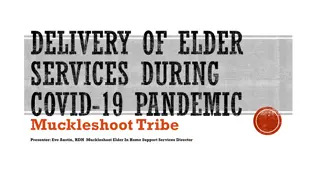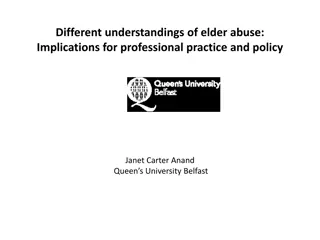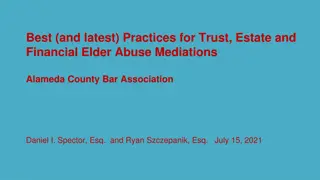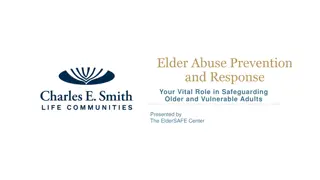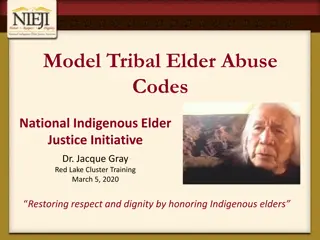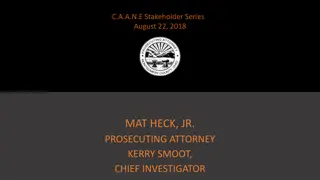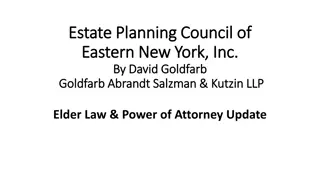Comprehensive Guide to Elder Law & Estate Planning Updates
Explore the latest updates in Elder Law and Estate Planning, including changes to Medicaid Asset Protection Trusts, important documents during COVID-19, and the significance of Last Will & Testament and Expanded Planning Power of Attorney. Discover key insights for asset protection, incapacity planning, financial management, and long-term care considerations in light of current challenges. Stay informed with expert advice from Ronald Fatoullah, Esq., to safeguard your future and legacy effectively.
Download Presentation

Please find below an Image/Link to download the presentation.
The content on the website is provided AS IS for your information and personal use only. It may not be sold, licensed, or shared on other websites without obtaining consent from the author. Download presentation by click this link. If you encounter any issues during the download, it is possible that the publisher has removed the file from their server.
E N D
Presentation Transcript
Elder Law Update Medicaid Asset Protection Trusts Changes to Medicaid Home Care Ronald Fatoullah, Esq. August 2020 www.fatoullahlaw.com 1-877-ELDER-LAW or 1-877-ESTATES 212-751-7600 - 516-466-4422 - 718-261-1700
Estate Planning, Important Documents During COVID 19 Attorney Estate Planning Document Preparation Elder Care Planning Planning for Incapacity Financial Advisor Wealth Management Investments Maintenance of the legal and financial plan Retirement Planning Projection of long term income and expenses Long Term Care Insurance CPA Tax planning and preparation Financial record-keeping Geriatric Care Manager Assess, plan, coordinate, monitor and provide services for the older adult www.fatoullahlaw.com 2
The Five Most Important Documents, Especially Now During The Pandemic Last Will & Testament Elder Care Planning Power of Attorney & Statutory Gifts Rider Health Care Proxy Living Will Living Trusts www.fatoullahlaw.com 3
Last Will & Testament We are all confronted with our mortality to a greater degree as a result of Covid 19 Where will your assets go when you pass away The Testator, Executor and Beneficiaries Beneficiaries can be individuals, family, friends, a charity, a testamentary trust, etc. Executor can be a beneficiary Tailor your will to your individual wants and needs Avoid a will contest if at all possible Spouse s Right of Election www.fatoullahlaw.com 4
Expanded Planning Power of Attorney We are also confronted with the possibility of our incapacity as a result of the virus. We all know individuals who have struggled with the disease A good Expanded Planning Power of Attorney is a document in which an individual gives the right to another individual(s) to handle their finances, protect assets, write checks, create, modify and revoke trusts, do Medicaid planning, do estate planning, make tax elections, disclaim assets, protect the family home, make gifts, etc. A POA is a Principal/Agency relationship Can name one or more agents, either together or successively; New Power of Attorney legislation passed the NYS House and Assembly this week, would do away with the Statutory Gifts Rider and would encourage institutions to honor the Power; Provisions that the Elder Law Attorney adds to the Power of Attorney is key; A FORM POA IS NOT GOOD ENOUGH FOR ESTATE OR LONG-TERM CARE PLANNING www.fatoullahlaw.com 5
Health Care Proxy and the Family Health Care Decisions Act Statutory form Unlike POA, can only name one individual at a time, but can have multiple successors Only takes effect when you are unable to make your own health care decisions Important to establish that you have discussed your wishes regarding artificial nutrition and hydration with your agent(s) Term should be indefinite The 2 witnesses should not be anyone named as an agent on the Health Care Proxy No notary needed www.fatoullahlaw.com 6
- Living Trust The Gold Standard to Protect Assets Definition of a Living Trust The Grantor (Settlor or Creator), Trustee(s) and Beneficiaries Can protect assets for Long-Term Care while preserving tax advantages such as a tax basis step-up for capital gains taxes The $250,000 Capital Gains Tax Exclusion will be preserved for the sale of a primary residence held by the trust Will avoid probate Can even provide for continuing trusts to protect assets after the death of the Grantor BE AWARE: No principal of the trust can go to Grantor www.fatoullahlaw.com 7
Virtual Execution of Documents - Notarization - Governor s Executive Order 202.7 (3/19/2020) which allowed for remote notarial acts is now extended through September 4, 2020. It is possible that this date will be extended The full document must be sent by the signor to the notary Must have live audio-video conferencing that allows for direct communication and is NOT pre-recorded The individual who is signing the document must be known to the notary or show valid photo ID during the signing. It is good practice to take a screen shot for your file For notarization (not witnessing) individual must affirmatively state that he or she is presently in NY State Notary may notarize the transmitted copy of the document and transmit same back to the person Notary may repeat the notarization as of the date of execution provided Notary receives the original signed document together with the electronically notarized copy within thirty days after the date of execution 8
Virtual Execution of Documents - Witnessing - EO 202-14. (4/7/2020)- has been extended through September 4, 2020 Person must present valid photo ID if not personally known to witnesses Video conference technology allows for direct interaction among the person, the supervising attorney and the witness Witnesses must receive a legible copy of the signature page, which may be transmitted via fax or electronic means, on the same day of the signature The witnesses may sign a transmitted copy of the signature page and transmit the signed copy back to the person who requested the witness The witnesses may sign the original signature page within 30 days of the date of execution The witnesses may repeat the witnessing of the original signature page as of the date of the execution provided the witnesses receive such original signature pages together with the electronically witnessed copies within thirty days after the date of execution www.fatoullahlaw.com 9
Who Pays for Long-Term Care? Private Pay - Unaffordable for most Medicare - Typically will not pay for LTC Long-term Care Insurance - Most don t have it Veteran s Benefits - Aid & Attendance Benefits watered down with 3 year lookback period for transfers and a potential 5 year wait as of October 18, 2018 Spousal Liability- Spouse is liable for the cost of long-term care of his/her spouse, even costs paid for by Medicaid. Advance planning is essential to protect the assets of the well spouse
Planning for the Medicaid Lookback Period Overview of the Medicaid Asset and Income Requirements NEW 30 MONTH LOOKBACK FOR HOME CARE ADVANCE PLANNING IS ESSENTIAL Medicaid Transfer Penalties Exempt Transfers Non-exempt Transfers www.fatoullahlaw.com 11
Overview of the Medicaid Asset and Income Requirements Assets: The Medicaid applicant may keep up to $15,750 plus exempt assets such as retirement accounts in payout status, the home in certain circumstances, irrevocable burial pre-need agreements of any amount, reparation payments, etc. The well spouse in the community may keep $74,820 or of the couple s assets, but no greater than $128,640 Income: For Nursing Home care (Institutional Medicaid), a Medicaid applicant may only keep a $50 personal needs allowance plus any cost of health insurance premiums The well spouse in the community can keep up to $3,216.00 of the total household income For Home Care (Community Medicaid), a Medicaid applicant may only keep $875/month ($1,284/month for a couple) + $20 disregard for a total of $895/month An Applicant for Home Care may keep income in excess of the Medicaid allowable limits through the use of a Pooled Trust www.fatoullahlaw.com 12
Overview of the Medicaid Asset & Income Requirements, Cont. A spouse can sign a Spousal Refusal but beware of spousal suits that could be initiated by DSS or HRA (in NYC) The 5-year look-back period applies to nursing home Medicaid and currently there is no look-back period for Medicaid home care or community- based services However, effective January 1, 2021 a 30-month look-back period will be applied to Medicaid home care and community-based services, for transfers made on or after October 1, 2020 www.fatoullahlaw.com 13
Medicaid Eligibility - Home Care New Rules Effective October 1, 2020 To Be Implemented January 1, 2021 1. The NYS proposed budget included the elimination of Spousal Refusal in a home care setting, and reducing the CSRA to the lowest federal level, or approximately $25,000. But thankfully, this was not in the final budget Assets the applicant can keep up to $15,750 plus exempt resources (up to $23,100 for a couple) Income the applicant can keep $875/month ($1,284/month for a couple) + $20 disregard for a total of $895/month Keep more income The importance of a Pooled Income Trust. These pooled trusts will still work to protect income after January 1, 2021. The transfer of assets and the transfer of income creates a penalty period, but if used by the pooled trust for the recipient, it would be a compensated transfer Federal law provides that states can provide for a look-back No look back for applications submitted prior to January 1, 2021 6. NEW 30 MONTH LOOK BACK PERIOD commencing January 1, 2021 FOR GIFTS MADE ON OR AFTER OCTOBER 1, 2020. The Medicaid application will need to include 30 months of financial records BUT ONLY GOING BACK TO OCTOBER 1, 2020 for the applicant and the spouse. Although Spousal Refusal is still viable, the spouse s assets for the lookback must be provided to DSS or HRA 7. ADVOCACY OF THE ELDER LAW ATTORNEY IS EXTREMELY IMPORTANT - Difficulty in obtaining hours now, but this will be greatly exacerbated commencing a likely implementation date of January 1, 2021 8. IMMEDIATE PLANNING IS ABSOLUTELY ESSENTIAL IN LIGHT OF THE NEW LAW 2. 2. 3. 4. 5. www.fatoullahlaw.com 14
UNPRECEDENTED PLANNING OPPORTUNITY THE WINDOW WILL SHUT IN JUST 2 MONTHS VERY IMPORTANT: Implementation of the lookback for Community based Home Care has been postponed to January 1, 2021, and asset transfers prior to October 1, 2020 will likely not be penalized. What Does This Mean? Unprecedented opportunity for planning if you are going to need Medicaid Home Care Services. You now have an additional two months to make transfers and ensure financial eligibility. Don t wait take action NOW! www.fatoullahlaw.com 15
Medicaid Transfer Penalties When an individual applies for Medicaid nursing home care, Medicaid will look back 5 years to see what assets the applicant and spouse (if any) had, and what assets were gifted away by the applicant (and spouse) As stated above, there is a 30-month Medicaid look-back for applications submitted on or after an implementation date of January 1, 2021 for home care and community-based services. The current provisions for the start date of nursing home penalty are unrealistic in the context of home care. DOH has advised that the penalty period would start once both financial and non-financial eligibility were established. A physician's letter confirming need for requisite level of care will likely establish non-financial eligibility. If money was gifted during the look-back, Medicaid calculates a so-called penalty period that will cause the applicant to become ineligible for Medicaid coverage for a period of time For New York City applicants, every $12,844 ($13,407 for Long Island and $12,805 for Westchester and Northern Metropolitan area) that is gifted away during the look-back will create a one-month period of ineligibility For institutional applicants, the look-back period starts when applicant is institutionalized, applies for Medicaid benefits and is otherwise eligible except for gifts that were made For home care and community-based applicants the look-back period commences when the applicant is receiving services for which Medicaid would be available based on an approved application, but for the transfer penalties. But, at home, an applicant can t receive home care that Medicaid would cover until Medicaid is approved. So, obviously, there will need to be technical corrections to the new home care look-back changes For example, a transfer of $128,440 by a NYC resident within the 5-year or 30-month lookback period will create a 10-month period of ineligibility www.fatoullahlaw.com 16
2020 Regional Rates for Medicaid New York State Department of Health (DOH) issued Regional Rates to determine penalty periods for institutionalized individuals. Said rates change every year. Current rates for Medicaid applicants on or after January 1, 2020. New York City - $12,844 Long Island - $13,407 Northern Metropolitan - $12,805 Northeastern - $11,295 Central - $10,451 Rochester - $12,460 Western - $10,720 RATES WILL NOW APPLY TO TRANSFERS MADE BY HOME CARE MEDICAID APPLICANTS The rates have increased for 2020 in all regions except for Long Island. Higher regional rates translate into a shorter waiting or penalty period for Medicaid purposes Medicaid districts will use the rate of the region in which the facility is located. The Medicaid application is submitted in the Medicaid region of the applicant s residence 1 7 www.fatoullahlaw.com
Exempt Transfers Exempt transfers refer to gifts made during the look-back that will not cause a Medicaid penalty period. Trust is typically not utilized for these transfers: Exempt transfers include: 1. Transfers to the well spouse but beware of spousal limits and spousal lawsuits 2. Transfers to applicant s blind or disabled child of any age but beware of any effect on the child s own benefits (e.g. Medicaid, SSI) 3. Transfers for fair market value 4. Transfers made exclusively for a purpose other than qualifying for Medicaid (difficult to get) 5. Transfers that have been returned ( Return of Gift ) www.fatoullahlaw.com 18
ADDITIONAL EXEMPT TRANSFERS All of the transferred assets have been returned to the individual Partial return reduces penalty proportionally* Individual used assets to purchase: an annuity life estate promissory note, loan, or mortgage www.fatoullahlaw.com 19
Exempt Transfers of the Home Exempt transfers of the primary residence (the Homestead ) 1. Transfer of the home to a spouse 2. Transfer of the home to a disabled, blind or minor child (but consider the child s benefits!) 3. Transfer of the home to a sibling of the A/R with an equity interest and who resided in the home for one year prior to institutionalization 4. Transfer of the home to an adult caregiver child who resided in the home for at least two years prior to institutionalization ( Caretaker Child exception) Home Equity Limitation: The Deficit Reduction Act of 2005 signed by President Bush on February 8, 2006 expanded the look-back to 5 years and also provided for a limitation on the equity value of a home in order to qualify for Medicaid The equity limitation is currently $893,000 Value of homes, condos & co-ops in NYC, Westchester and Long Island often exceed $893,000 Equity limitation does not apply if there is a spouse or a minor, blind or disabled child living in the home www.fatoullahlaw.com 20
Transfer Penalty Would Cause Undue Hardship Denial of eligibility would cause an undue hardship, i.e., it would: deprive the individual of medical care such that the individual s health or life would be endangered Hardship if nursing home threatens discharge if Medicaid not secured and payment not made. FH 6657601M Albany, FH 67841713Z Schenectady; FH No. 6660774R Suffolk Hardship if would deprive the individual of food, clothing, shelter, or other necessities of life. 366 subd. 5 (e)(4)(iv) and THIS IS DIFFICULT TO PROVE IN A NURSING HOME CONTEXT BUT CAN BE USED IN THE HOME CARE CONTEXT AFTER OCTOBER 1, 2020 Hardship if unable to have the resources returned despite best efforts, or can t obtain fair market value for them, or cannot void a transfer to a trust fund *How much cooperation & effort is required of applicant or agent with a power of attorney to get funds back has been the subject of fair hearings. See, e.g,. FH #5153034Y (Albany Co. 5/12/09)(no hardship found), FH No.6660774R, Suffolk Co. 3/12/2014 (undue hardship exemption granted) www.fatoullahlaw.com 21
Undue Hardship Cont. DOH has not yet determined how Undue Hardship will be applied to long- term care in the homecare setting and in addition, how the prohibition against Undue Hardship based on the applicant s income and resource levels (an issue for nursing home Medicaid) would be resolved for community long-term care purposes. *How much cooperation & effort is required of applicant or agent with a power of attorney to get funds back has been the subject of fair hearings. See, e.g,. FH #5153034Y (Albany Co. 5/12/09)(no hardship found), FH No.6660774R, Suffolk Co. 3/12/2014 (undue hardship exemption granted) www.fatoullahlaw.com 22
Which Community-Based Services Will The New Lookback Apply To? Personal care services, such as a home health attendant (likely will include CDPAP) Home health care services, which includes skilled nursing and therapy Private duty nursing Assisted Living Program (ALP beds) And the NYS Department of Health can, in the future, even designate other services which will be effected by the look-back www.fatoullahlaw.com 23
Pooled Income Trusts A trust organized and operated by a non-profit organization that pools the funds of many Grantors, and uses these funds to pay certain expenses of the various Grantors Permits Grantor/Medicaid applicant-recipient to reduce monthly income so that there is no spend down (income in excess of Medicaid income levels - $875/mo. +$20) plus health insurance premiums Without the pooled income trust, Medicaid recipient would have to spend down any excess income before Medicaid will pay for services www.fatoullahlaw.com 24
Pooled Income Trust cont. Trust must be irrevocable, but Grantor may leave the trust upon: Death Admission to a nursing home Failure to make monthly deposits into trust Each month the Medicaid recipient submits expenses to the trust to be paid on his/her behalf Expenses the trust can pay include: Rent or mortgage Utility bills Approved reimbursement for third parties who paid Grantor s expenses Credit card payments (no past due charges) www.fatoullahlaw.com 25
Can A Pooled Income Trust Be Used After January 1, 2021? YES! BUT, care must be taken to avoid a gift of income into the Trust Transfer penalties apply to income as well as assets So, monthly transfers of income to a pooled income trust are, indeed, considered transfers; however, it will not be considered a transfer if the income contributed is used for the benefit of the applicant However, as we will see next, a compensated transfer is not considered a gift, and is therefore exempt from the transfer rules as long as the money in the pooled income trust is used for the applicant www.fatoullahlaw.com 26
Pooled Trusts Cont. Local DSS will be required to review the use of the pooled trust on a periodic basis, rather than every month, and the New York State Bar Association will be lobbying for annual review at time of Recertification. This is more practical and funds could be used meaningfully to keep people living in the community. www.fatoullahlaw.com 27
Home Care Assessment & Eligibility Currently: if applicant needs any assistance with Activities of Daily Living for 120+ days may enroll in MLTC If don t need ADL assistance, can still get Housekeeping assistance up to 8 hrs/week from LDSS/HRA ( Level 1 personal care) for Instrumental ADLs Non-dual gets personal care from mainstream plan New Applicants 10/2/20: Level 1 Housekeeping will no longer be a Medicaid personal care service. www.fatoullahlaw.com 28
New ADL Requirements for Home Care Limited assistance with physical maneuvering with more than two ADL s (3+ ADLs) or Persons with dementia or Alzheimer's diagnosis must need at least supervision with more than one ADL (2+ ADLs) People already receiving personal care, housekeeping, or CDPAP services as of 10/1/20 are grandfathered in After 10/1/20, a new Assessment Instrument will be used and it will be an evidence-based validation NY Medicaid Choice will use the new standard (ADLs) & new assessment instrument in the conflict-free MLTC determination, and local districts/HRA and mainstream Managed care plans will use it for those not eligible for MLTC Applicants for personal care or CDPAP after 10/1/20 must need: www.fatoullahlaw.com 29
3 ADL Requirement of Physical Maneuvering Unless the individual has dementia or Alzheimer s diagnosis, an ADL will count toward the minimum 3 ADLs only if needs at least limited assistance with physical maneuvering. Degrees of assistance: 1. Independent 2. Independent, setup help only Article or device placed within reach, no physical assistance or supervision in any episode 3. Supervision Oversight/cuing. Will not count unless Dementia diagnosis 4. Limited assistance Guided maneuvering of limbs, physical guidance without taking weight 5. Extensive assistance Weight-bearing support (including lifting limbs) by one helper where person still performs 50% or more of subtasks 6. Maximal assistance Weight-bearing support (including lifting limbs) by two or more helpers; or, weight-bearing support for more than 50% of subtasks 7. Total dependence Full performance by others during all activity www.fatoullahlaw.com 30
New Standardized Task-based Assessment Tool Will Be Used to Determine Hours by April 1, 2021 Tool will be evidence-based and used to assist the local DSS to make appropriate and individualized determinations for the number of personal care services and CDPAP hours of care each day -currently, the number of hours is determined by each plan using their own tasking tool The new tool should identify how need for assistance with ADL s can be met through: Telehealth- Unclear how telehealth may assist with assisting a consumer with transferring, dressing, and toileting Family and social supports-- Now, their assistance is voluntary. Often plans wrongly presume family is available. Even if they are, their assistance must be acceptable to consumer. 18 NYCRR 505.14(b)(3)(ii)(b), 12 OHIP-ADM-01, GIS 97 MA/033 www.fatoullahlaw.com 31
TREATING PHYSICIANS ROLE IN PRESCRIBING PERSONAL CARE OR CDPAP IS REPLACED NEW: Personal care and CDPAP services must be prescribed by a qualified independent physician selected or approved by DOH. DOH may use Maximus (NY Medicaid Choice). Concerns: A contract physician lacks familiarity with the consumer s condition, compared to a long-time trusted physician and may not specialize in the consumer s particular diagnosis, Will add more delays to applying for services must arrange an assessment by independent physician to apply Though a physician s order is now required for both personal care and CDPAP, MLTC plans have generally not required them for personal care, but have required them for CDPAP www.fatoullahlaw.com 32
Independent Assessor to Replace DSS, MLTC & Medicaid Managed Care Plans in Determining Hours The assessor will determine how much Personal care and CDPAP to be authorized. The law allows DOH to expand the Maximus contract to do conflict-free assessments and final determination The local districts will make all home care determinations for those exempt or excluded from MLTC or Medicaid managed care, Immediate Need, and mainstream plan determinations of hours. www.fatoullahlaw.com 33
Extra Review of High-Hour Consumers to Determine Safely Living in the Community For personal care recipients, the law goes a step further in its stated concern for safety. The law authorizes DOH to adopt standards and assessment of services for individuals whose need for such services exceeds a specified level to be determined by DOH : MRT recommended this level as 12+ hours/day Assessor will consider whether consumer, with the provision of such services, is capable of safely remaining in the community in accordance with the standards in Olmstead, 527 US 581 (1999) Who determines safety? What about the consumer s autonomy their right to the dignity of risk in choosing to accept some risks that may exist in the community in order to live at home as they choose- if provided enough hours of care, safety can be reasonably ensured www.fatoullahlaw.com 34
Immediate Needs Program Purpose of Immediate Needs is to implement and ensure safe and urgent care for the applicant when needed. This program has specific processes set up to abbreviate the normal requirements and evaluation of eligibility to implement services. An applicant will be able to attest that no transfers were made during the look back period (unless the transfer was an exempt transfer). www.fatoullahlaw.com 35
Consumer Directed Personal Assistance Program (CDPAP) At Risk DOH blames CDPAP program growth for large MLTC enrollment growth Unique program allows family other than spouses to be paid caregivers; aides may do skilled tasks normally prohibited; more flexibility in structuring hours The fiscal intermediary pays the aide wages and benefits The number of Fiscal Intermediaries (FI) will be drastically reduced (from about 600 to 25) and a list was announced on 7/17/20 Going from fee for service to per member per month If a recipient s FI is closing, they must be provided written notice 45 days before service will end. Notice is to go out to the consumer, consumer representative, personal assistants, the department and local social services district or managed care plan. Within 5 days the consumer must be provided a list of other FIs The Power of Attorney or Health Car Proxy can be the personal attendant. New applicants for home care will no longer be notified of availability of CDPAP program and limits opportunity to apply to no less than annually If a consumer needs more than 12 hours per day, an independent medical review will be required to determine if reasonable or appropriate or even different type of Medicaid service may be appropriate. www.fatoullahlaw.com 36
Irrevocable Medicaid Asset Preservation Trust Trust Requirements: Must be Irrevocable Settlor should not serve as Trustee (best Any principal or income that can be distributed to the Settlor or Settlor s spouse will be considered available for Medicaid purposes Discretionary payments to Settlor/Settlor s spouse will be available even if never distributed www.fatoullahlaw.com 37
Irrevocable Medicaid Asset Preservation Trust cont. Advantages: Ability to live in home & receive income Considered a completed transfer for Medicaid purposes Decision-making can be easier and more efficient Can provide protection against children s creditors Income tax benefits Real Estate tax exemptions preserved IRC Section 121 Exemption can be maintained Can preserve step-up in basis upon Settlor s death Can reserve limited power of appointment to make changes to beneficiaries May direct Trustees to sell property & exchange for new property Can revoke trust under certain circumstances www.fatoullahlaw.com 38
Transfers of Real Property Including a Primary Residence Into a Trust Ability to live in home Ability to receive rental income (if desired) May direct Trustees to sell property and exchange for new property Section 121 Exclusion Maintain basis step-up Asset included in estate of Settlor Limited Power of Appointment Maintain degree of control/independence 3 9 www.fatoullahlaw.com
Transfers of Liquid Assets Transferring Brokerage Accounts to a Trust Low basis versus high basis assets Maintain step-up for low basis assets Completed gift and no estate inclusion for high basis assets (less relevant now in NY given the high NYS exclusions) Consider income tax consequences for beneficiaries Consider Grantor Trusts so Grantor will pay income taxes regardless of who receives income However, need to consider income being generated for Medicaid purposes 4 0 www.fatoullahlaw.com
Transfers to Trust Outright Transfers (Gifts) Basis Step-Up Sec. 121(a) is available for Grantor(s) Asset Protection Carryover Basis No Sec. 121(a) for Donor Creditor Issues Pre-deceased child/Donee Divorce www.fatoullahlaw.com 41
Medicaid and COVOD-19 As of 3/18/2020 Special regulations and easier to apply: If case was due for renewal automatic; renewal submission not required and will be approved even if financial review shows ineligibility If SSI or receiving Temporary Cash Assistance, Medicaid will be automatically authorized, instead of normal certification process If met spenddown or pay-in for March 2020 or later months, will get 6 months coverage www.fatoullahlaw.com 42
Medicaid and COVOD-19 Cont. Many Medicaid offices closed in NYC, but HRA now accepting e-FAX applications: PUBLIC e-fax 917-639-0732 Authorized Submitters (C-Rep) 917-639-0731 May attest rather than verify income & assets, even for nursing home or home care. Medicare enrollment not required. Still need to complete App & Supp A. Must verify citizenship or immigration status, but if difficult to verify it, will get 90 days coverage while obtaining documents, may be extended 90 more days Requests for Information HRA/DSS must call or email applicant and accept info by phone www.fatoullahlaw.com 43
FAIR HEARINGS Being held by telephone only during COVID-19 emergency Appellants or representative may email documents in advance of the hearing to: otda.sm.fhdocuments.submissions@otda.ny.gov FAX 518-473-6735 OTDA GIS 3/12/2020, http://otda.ny.gov/policy/gis/2020/20DC014.pdf www.fatoullahlaw.com 44
Elder Law Update Medicaid Asset Protection Trusts Changes to Medicaid Home Care Ronald Fatoullah, Esq. August 2020 www.fatoullahlaw.com 1-877-ELDER-LAW or 1-877-ESTATES 212-751-7600 - 516-466-4422 - 718-261-1700
